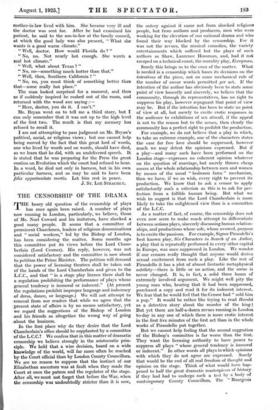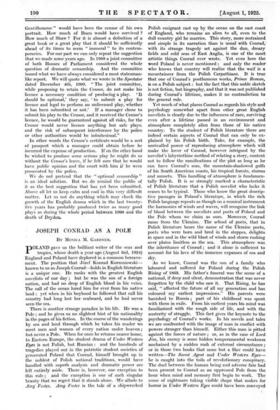THE CENSORSHIP OF THE DRAMA T HE hoary old question of
the censorship of plays has once again been raised. A number of plays now running in London, particularly, we believe, those of Mr. Noel Coward and his imitators, have shocked a good many people. It seems that a committee of prominent Churchmen, leaders of religious denominations and "social workers," led by the Bishop of London, has been considering the matter. Some months ago this committee put its views before the Lord Cham- berlain (Lord Cromer). His reply, however, was not considered satisfactory and the committee is now about to petition the Prime Minister. The petition will demand that the power of licensing theatres shall be taken out of the hands of the Lord Chamberlain and given to the L.C.C., and that "in a stage play licence there shall be a regulation prohibiting the performance of plays whose general tendency is immoral or indecent." (At present the regulations prohibit improper language and indecency of dress, dance, or language.) We will not attempt to I conceal from our readers that while we agree that the present state of affairs is by no means satisfactory, yet we regard the suggestions of the Bishop of London , and his friends as altogether the wrong way of going about the business.
In the first place why do they desire that the Lord ;Chamberlain's office should be supplanted by a committee of the L.C.C.? We confess that in this matter of dramatic censorship we believe strongly in the aristocratic prin- ciple. We hold that a wise decision, based on a wide knowledge of the world, will far more often be reached by the Court official than by London County Councillors. We see no reason to suppose that the instinct of our Elizabethan ancestors was at fault when they made the Court at once the patron and the regulator of the stage. After all, we must not forget that before the War, when the censorship was undoubtedly stricter than it is now, the outcry against it came not from shocked religious people, but from authors and producers, men who were working for the elevation of our national drama and who found their way blocked by the censorship. For it was not the revues, the musical comedies, the variety entertainments which suffered but the plays of such authors as Shaw, Laurence Housman, and, had it not escaped on a technical count, the morality play, Everyman.
Surely this brings us to the crux of the matter. What is needed is a censorship which bases its decisions on the intentions of the piece, not on some mechanical rule of the number of swear words permitted per act. If the intention of the author has obviously been to state some point of view honestly and sincerely, we believe that the community, through its representatives, has no right to suppress his play, however repugnant that point of view may be. But if the intention has been to state no point of view at all, but merely to excite erotic responses in the audience to exhibitions of sex stimuli, if the appeal is not to the reason but to the senses, then clearly the community has a perfect right to prohibit the production.
For example, we do not believe that a play in which, to take an extreme example, one of the characters states the case for free love should be suppressed, however much we may detest the opinions expressed. But if a play—and many such have been performed on the London stage—expresses no coherent opinion whatever on the question of marriage, but merely throws cheap sneers at the whole relationship between men and women by means of the usual "bedroom farce" mechanism, then we have, if we so wish, every right to prevent its production. We know that to ask a censor to apply satisfactorily such a criterion as this is to ask for per- fection from a fallible human being. But what we wish to suggest is that the Lord Chamberlain is more likely to take the enlightened view than is a committee of the L.C.C.
As a matter of fact, of course, the censorship does not even now seem to make much attempt to differentiate between serious plays, sincerely discussing human relation- ships, and productions whose sole, whose avowed, purpose is to excite the passions. For example, Signor Pirandello's best known play, Six Characters in Search of an Author, a play that is repeatedly performed in every other capital in Europe, was once suppressed in London. We wonder if our censors really thought that anyone would derive sexual excitement from such a play. Like the rest of Pirandello it has a plot of almost fantastic metaphysical subtlety—there is little or no action, and the scene is never changed. It is, in fact, a solid three hours of extremely involved argument. We might well pity the young man who, hearing that it had been suppressed,. purchased a copy and read it for its indecent interest. We fear that he would feel that the Censor had" sold him a pup." It would be rather like trying to read Hamlet as a detective story about the murder of the king But yet there are half-a-dozen revues running in London to-day in any one of which there is more erotic interest in the first five minutes of the first act than in the whole works of Pirandello put together.
But we cannot help feeling that the second suggestion of the Bishop's committee is far worse than the first. They want the licensing authority to have power to suppress all plays "whose general tendency is immoral or indecent." In other words all plays in which opinions with which they do not agree are expressed. Surely that would be the end of all real freedom of thought and opinion on the stage. Think of what would have hap- pened to half the great dramatic masterpieces of history if they had had to undergo such a test by a body of contemporary County Councillors. The "Bourgeois Gentilhomme " would have been the censor of his own portrait. How much of Ibsen would have survived ? How much of Shaw ? For it is almost a definition of a great book or a great play that it should be sufficiently ahead of its times to seem " immoral " to its contem- poraries. For our part we can only repeat the suggestion that we made some years ago. In 1909 a joint committee of both Houses of Parliament considered the whole' question of dramatic censorship. And the committee issued what we have always considered a most statesman- like report. We will quote what We wrote in the Spectator dated December 4th, 1909. "The joint committee, while proposing to retain the Censor, do not make his licence a necessary condition of producing a play. 'It should be optional,' they say, 'to submit a play for licence and legal to perform an unlicensed play, whether it has been submitted or not.' If a manager chose to submit his play to the Censor, and it received the Censor's licence, he wou•ld be guaranteed against all risks, for the Censor would never licence anything but safe plays, and the risk of subsequent interference by the police or other authorities would be infinitesimal."
In other words the Censor's certificate would be a sort of passport which a manager could obtain before he incurred the expense of production. If on the other hand. he wished to produce some serious play he might do •so without the Censor's leave, if he felt sure that he would have public opinion and the court with him if he were prosecuted by the police.
We do not pretend that the "optional censorship" is an ideal sOlution. But we do remind the public of it as the best suggestion that has yet been submitted. Above all let us keep calm and cool in this very difficult Matter. Let us not do anything which may check the growth of the English drama which in the last tWenty- five years has probably produced twice as many good plays as during the whole period between 1900 and the death of Dryden.







































 Previous page
Previous page